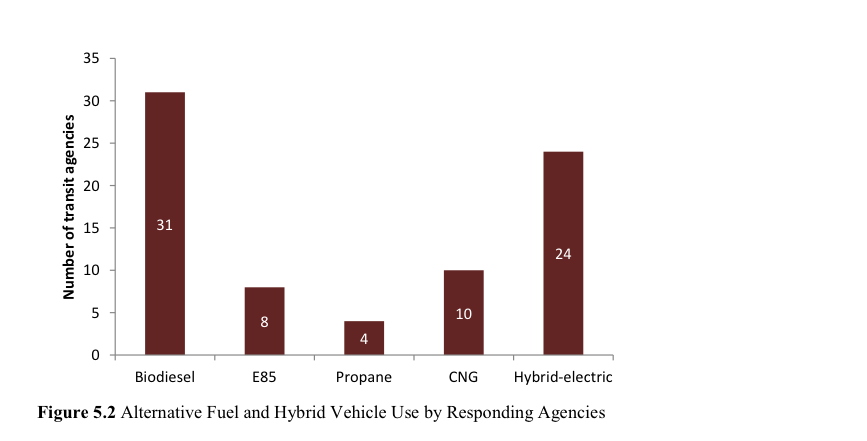UPPER GREAT PLAINS TRANSPORTATION INSTITUTE
Introduction
Transit agencies of all sizes across the country have been or are considering using alternative fuels or hybrid-electric vehicles. The use of these alternatives has increased in recent years due to concerns about environmental and energy issues and increased incentives and regulations from local, state, and federal governments that have encouraged their use. Transit agencies have been leaders in using alternative fuel vehicles. Smaller transit agencies, including those operating in small urban and rural areas, however, may face greater difficulties in transitioning to alternative fuel or hybrid vehicles. Infrastructure or capital costs could be prohibitively expensive, or they could lack the resources and expertise to successfully operate these vehicles. Furthermore, the supply of alternative fuel or hybrid vehicles that are designed to meet their standards could be limited, as could an adequate and dependable supply of the fuel in rural and small urban areas. Reliability and maintenance issues could also be a concern for smaller agencies that could face significant disruptions in service if any of their vehicles are out of service.
Small urban and rural transit agencies need to be fully informed of the costs and benefits of alternative fuels and hybrid vehicles before adoption, and they can learn from the experiences of those that have been using these alternatives. Decision makers also need to understand the needs and concerns of transit agencies. Policies should be adopted so they avoid encouraging agencies to adopt alternatives that are too costly or problematic. An understanding of the factors motivating an agency to adopt an alternative fuel and the deterrents that prevent them from doing so could also be helpful for policy makers and industry leaders who desire increased use of alternative fuels and hybrid vehicles.
Objectives
The objectives of this study are 1) to identify and describe the usage of alternative fuel and hybrid vehicles by small urban and rural transit agencies; 2) to identify the motivating factors for the adoption of alternative fuels and hybrids for these agencies; 3) to document the deterrents for adoption; 4) to describe the experience of transit agencies that have adopted alternative fuels or hybrid vehicles, including costs, fuel economy, maintenance, reliability, etc., and the overall satisfaction; 5) to determine how use varies by characteristics of transit agencies and beliefs about deterrents and benefits; and 6) to determine which factors explain the difference between those agencies with a satisfactory experience and those that have experienced difficulties.
Methods
To accomplish these objectives, a survey was conducted of small urban and rural transit providers. Small urban providers are defined as those operating in urbanized areas with a population below 200,000. Responses were received from 115 agencies across the country. This study examines the use of biodiesel, E85, propane, natural gas, and hybrid-electric vehicles. The survey asked users to identify motivations and concerns regarding their decision to adopt and to describe problems experienced and their overall satisfaction. Non-users were asked to identify deterrents and potential benefits from adoption. Differences between users and non-users, small urban providers and rural providers, and between the different fuel alternatives were analyzed. Survey design and administration are discussed in section 4, characteristics of responding agencies are presented in section 5, and results from the survey are analyzed in sections 6-13. A logit model is developed and estimated in section 14 to analyze the impacts of agency characteristics and perceived benefits and deterrents on the adoption and satisfaction with biodiesel and hybrid vehicles. The next two sections of the paper provide background information on alternative fuels and hybrid vehicles, including a review of previous studies on the benefits and deterrents of each.

Download the full report (PDF): Use of Alternative Fuels and Hybrid Vehicles by Small Urban and Rural Transit Systems
About the Upper Great Plains Transportation Institute
www.ugpti.org
“The Upper Great Plains Transportation Institute (UGPTI) is an independent center at North Dakota State University which is guided, in part, by an advisory council composed of representatives of various organizations industries and agencies affecting or affected by transportation.”
Tags: Alternative Fuels, Rural Transit Systems, Small Urban Transit Systems, Upper Great Plains Transportation Institute






 RSS Feed
RSS Feed